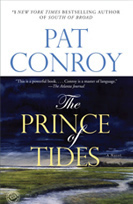

- In the prologue Pat Conroy sets up many of the novel’s themes: his characters’ love of the Low Country and the South; the power Lila Wingo had over her children, who all adored her, their love of the natural world that shaped all three of their futures. In the midst of this idyllic piece of glorious signature Conroy writing, what signals does he give to his readers about the darkness that is to come in this novel?
- The novel begins when Tom Wingo, a recently fired teacher and coach, married to a successful physician, and father of three, receives a call from his obviously manipulative mother asking him to go to New York to help his twin sister, Savannah, who has once again attempted suicide. His three young daughters had just expressed embarrassment that he, unlike their friends’ fathers, stays home and cooks meals while it is their mother who goes to work. What other event takes place before he leaves that makes him feel a failure, what he calls “a mediocre man”?
- When Tom appears to be teasing his young daughters, he tells them that there is only one rule of life they must follow: “Never listen to what your parents say. Parents were put on earth for the sole purpose of making their children miserable. It is one of God’s most important laws…Both Mama and I are screwing you up. If we knew how we were doing it we would stop because we adore you. But we’re parents and we can’t help it. . . .We are your enemies.” Are there any examples of good parenting in this novel that would argue against this warning?
- Pat Conroy willingly admits that his novels are informed to a great degree by his life experiences. The Great Santini was about growing up as the son of a physically violent and abusive Marine fighter pilot. “I created a boy named Ben Meechum and gave him my story,” says Conroy. In The Lords of Discipline, he took on his military college, The Citadel, in a book that resulted in a twenty-years-plus feud between the author and his school, which was only recently resolved. In writing The Prince of Tides Conroy attempts to come to terms with his childhood and with the realization that his mother may well have been the more powerful parent and the source behind the self-deception and family secrets that crippled her children. And yet he says in the novel, “In families there are no crimes beyond forgiveness.” Do you believe him when he says this?
- The Prince of Tides is filled with stories of transformation, for example, his father’s wartime conversion to Catholicism, his sister Savannah’s becoming a New Yorker. Can you name others?
- The idea of twins has deep roots in literature, from Romulus and Remus in mythology, to Jacob and Esau in the Bible, to the twins in the more recent novel The Memory Keeper’s Daughter. Can you think of other examples in literature? How are Tom and Savannah alike? How are they different?
- When Tom first encounters Dr. Lowenstein, his sister’s psychiatrist, he is belligerent both to her and in his attitude toward the entire city of New York. Why do you think he is so suspicious? Do you feel she acted in the best interests of Savannah by involving her brother in her therapy? Tom is a teacher and Lowenstein is a psychoanalyst. In the end they help each other in ways they might never have predicted. Are the tools or the impulses that create teacher-coaches and therapists similar? How are they different? Does their relationship have anything to say about class issues? Give other examples of problems of communication brought about by class differences.
- What psychological tools besides denial does Tom use to distance himself from pain?
- Why do you feel Pat Conroy uses flashbacks throughout the novel? Do you find this technique helpful to you as a reader?
- One might say that the truest example of integrity seems to be exemplified in the character of Luke, the older brother. Do you agree? Why or why not?
- The natural world is clearly revered by Conroy. Can you find passages about nature that exemplify his power as a writer?
- Give examples of how Pat Conroy uses animals to advance the plot.
- Questions are raised regarding the price of gender throughout the novel. For instance, how does Lila treat Savannah differently from her sons? How does Savannah deal with the family’s secrets as opposed to the way her brothers deal with them?
- Do you think there is such a thing as a southern novel? Is The Prince of Tides a southern novel? If so, what does that mean to you?
- Who is the Prince of Tides?